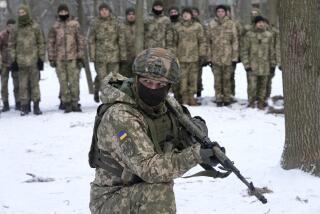Allies Quietly Assure Baker They’ll Fight : Diplomacy: Saudis, Egyptians and others will join U.S. troops in the event of war, official says. But most of the nations are reluctant to admit it.
- Share via
PARIS — Despite a reluctance to commit themselves publicly, Saudi Arabia, Egypt and other members of the international coalition in the Persian Gulf have assured Secretary of State James A. Baker III that their armies will fight beside American troops if military action is needed to drive Iraqi forces out of Kuwait, a senior Administration official said Friday.
“There is absolutely no doubt in my mind that Saudi forces will be committed,” said the official, who spoke to reporters traveling with Baker on the condition he not be identified.
He said he was similarly convinced that Egypt and remnants of the army of the exiled Kuwaiti government also would participate in attacking Iraq if the United States decides to take that course.
There were no doubts about the intentions of Britain, however, as Prime Minister Margaret Thatcher--who has been more hard-line than the United States since the crisis began--said her government is ready to fight if necessary.
Standing beside Baker after a 90-minute meeting Friday at her No. 10 Downing St. residence, Thatcher said: “The peaceful solution would be for Iraq to get out of Kuwait. That is a matter for them, and we hope they will do it. If not, we shall have to take the military option and see that Iraq does leave Kuwait.”
Baker’s meeting with Thatcher was something of an oasis in a week of hard-sell negotiations in Bahrain, Saudi Arabia, Turkey and the Soviet Union. He meets President Francois Mitterrand and other French officials today in Paris before returning to Washington.
The senior official said Baker hopes to learn today if France would join in an offensive. He said he does not yet know the position of either France or Syria.
As for Damascus, the official said, “I rather suspect that the Syrians will be leading the charge, but I don’t know.”
At the start of the trip, Baker said his primary purpose was to find out if other members of the coalition are prepared to take offensive military action to drive Iraq out of Kuwait or if they are willing only to defend Saudi Arabia from possible future Iraqi aggression.
He received no public commitments except from Thatcher and from the deposed emir of Kuwait, whose exiled government has about 4,000 army and air force personnel in Saudi Arabia.
For instance, after Baker met King Fahd in Jidda, a senior Saudi official seemed to say that his country was committed to nothing more than defending its own borders.
“We and our friends will defend and deter Saddam Hussein from attacking the kingdom,” the official said. “Anything beyond that, we will cross that bridge when we come to it.”
Friday found Baker in Moscow, London and Paris--the capitals of three of the other four permanent members of the U.N. Security Council. China is the fifth member. Baker spent Thursday night in Moscow after late-night meetings with Soviet Foreign Minister Eduard A. Shevardnadze, then flew to London for talks with Thatcher before going on to Paris in advance of his scheduled meeting with Mitterrand and other French officials.
The Soviet Union is the only one of the three nations that has not committed any troops to the gulf coalition. Although Soviet leaders have continuously stressed their reluctance to support armed action, Shevardnadze said Thursday that Moscow would not rule out the use of force if peaceful and political methods fail to dislodge Iraq from Kuwait.
In television interviews taped in Moscow, Baker said the United States continues to sound out other Security Council members about a resolution providing standby authority for offensive action against Iraq. However, he denied published reports that the resolution has already been drafted and is being circulated at the U.N. headquarters in New York.
Soviet President Mikhail S. Gorbachev, in Bonn on Friday on a two-day diplomatic visit to Germany, declared:
“Everything so far has been done jointly within the framework of the Security Council of the U.N. Up to now it has been a great victory. . . . I think the U.N., by cooperating and analyzing, will act consistently and decisively. There will be a resolution, and it will be taken by the U.N.”
In London, Thatcher said the United States and its partners already have ample legal authority to attack, and therefore a resolution would be unnecessary.
“The only question is how to keep this marvelous coalition absolutely together, and that will be considered,” she said, acknowledging that several nations have made it clear that they would move only in response to U.N. action. The Bush Administration holds a similar view, and it seems to have already decided that it must go to the United Nations to preserve allied unity.
Times staff writer Tyler Marshall, in Bonn, contributed to this report.
More to Read
Sign up for Essential California
The most important California stories and recommendations in your inbox every morning.
You may occasionally receive promotional content from the Los Angeles Times.













